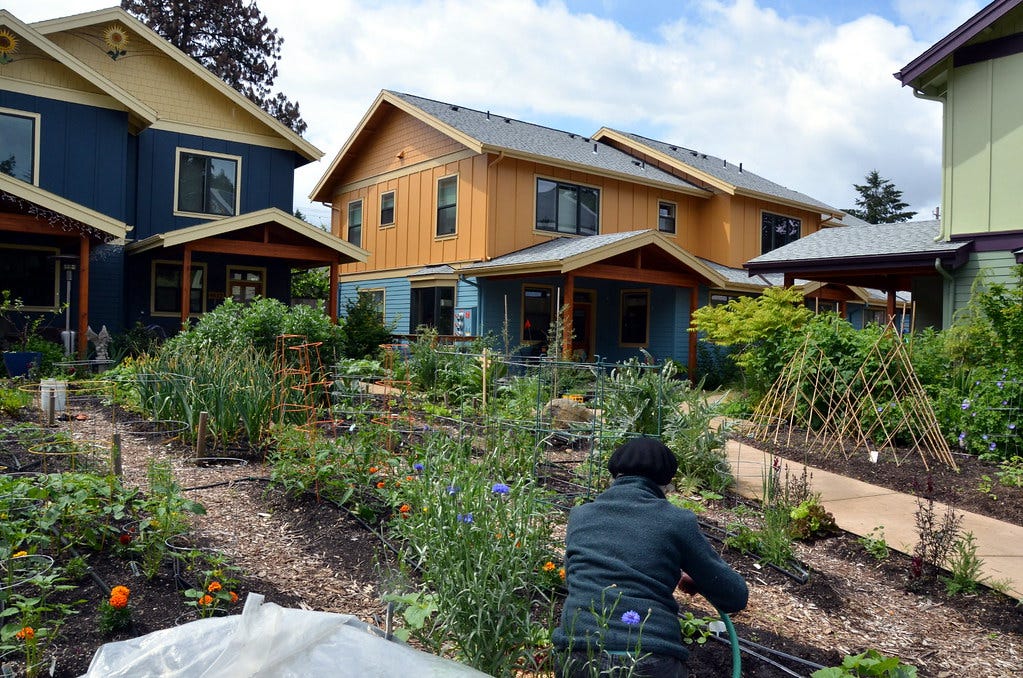
Portland, OR — In a city often caricatured for its craft beer, bike lanes, and fiercely independent culture, a quieter transformation is underway, one not driven by trend, but by a profound rethinking of what prosperity means. Across neighborhoods and disciplines, Portlanders are building what economists have started calling a Wellbeing Economy: a system where people and planet are prioritized as deliberately as profit, and where wealth is designed to circulate, not concentrate.
You won’t find a single headquarters for this movement, nor a neatly labeled map. What you will find is a loose but growing constellation of initiatives, cooperatives, mutual aid networks, urban farms, platform collectives, all knitting together a vision of shared abundance.
An Economy That Stays Home
In Portland’s Cully neighborhood, the economic logic begins to shift. Here, ROSE Community Development isn’t just building affordable housing, it’s embedding residents in the planning process. Nearby, the Community Credit Union of Portland offers loans and financial services aimed at strengthening local livelihoods, not just balance sheets.
Down the road, B-Line Urban Delivery uses electric cargo trikes to move goods from small producers to markets and homes, bypassing extractive logistics chains and modeling what a worker-centered, zero-emissions enterprise can look like.
Portland also boasts an active network of cooperatives, from food to housing to coworking spaces. Collective Agency, for example, operates as a democratic shared workspace where members co-own the future of their labor environment.
Reclaiming the Commons
In many neighborhoods, the economy looks less like a market and more like a shared tool shed. At Southeast Portland Tool Library, residents borrow everything from drills to hedge trimmers. The Repair Café PDX offers monthly events where volunteer tinkerers help fix broken appliances for free, cutting down on waste and restoring not just devices, but dignity.
Community gardens dot the urban fabric, but perhaps none are as woven into culture as Cully Community Garden, where immigrant families grow culturally significant crops and exchange knowledge across generations. Mutual aid groups like Portland Mutual Aid Network fill in gaps left by institutions, delivering food, medicine, and support with radical immediacy.
“This isn’t charity,” says a volunteer from the network. “It’s reciprocity. It’s a way of remembering that we belong to one another.”
Regeneration Over Growth
Outside the city core, the wellbeing economy takes on an ecological dimension. At Zenger Farm in East Portland, education and agriculture meet. Schoolchildren learn to grow kale and compost kitchen scraps, while low-income families access fresh produce and food literacy programs.
Portland is also home to several regenerative and permaculture-based projects, including Tryon Life Community Farm, which combines eco-education with hands-on living experiments in sustainability. Transition PDX, part of the global Transition Towns movement, hosts community resilience workshops, from DIY solar panels to local currency pilots.
What ties these projects together is a commitment to regeneration, not just ecologically, but socially. This means asking: who gets to benefit from sustainability? Who’s left behind?
Digital Justice and Community Tech
The digital divide is a fault line in every modern city, but Portland’s wellbeing economy includes efforts to bridge it. Free Geek, a nonprofit electronics recycler, offers refurbished computers and digital literacy training for those left out of the tech economy. At Open Signal, a media arts center, historically excluded communities gain tools to tell their own stories and broadcast them citywide.
Though smaller in number, Portland’s experiments with platform cooperativism, where workers co-own digital platforms, are gaining traction. Some of these ventures are still in seed stage, but they hint at a future where the gig economy could be reclaimed by the very people it currently exploits.
Where the Threads Connect, and Where They Don’t
While Portland’s wellbeing economy is diverse, it’s not evenly distributed. Indigenous-led economic initiatives, for example, are less visible, despite important work by the Native American Youth and Family Center (NAYA). Similarly, Black-led cooperative development remains limited, often hampered by access to capital and land. Disability justice, too, is unevenly integrated across otherwise progressive projects.
Still, there is growing awareness of these gaps, and increasing collaboration across lines of race, class, and geography. Organizations like Living Cully bridge community development, ecological justice, and anti-displacement strategies, showing that integrated approaches are both possible and powerful.
The City as an Ecosystem of Care
Portland’s wellbeing economy doesn’t always look like “the economy” at all. It looks like neighbors feeding each other. It looks like shared spaces for grieving and organizing. It looks like slow, patient stitching of trust between people who’ve never met, but share the belief that more is possible.
For those who only measure economic health by GDP or job creation, these efforts might appear marginal. But for many Portlanders, they represent not just alternatives, but foundations for a post-capitalist future already taking root.
As one organizer put it: “We’re not waiting for permission to build the world we need. We’re doing it now, with what we have, where we are.”




Awesome piece!! This is one of my favorite things about Portland and the Willamette Valley in general. People are willing to try out new ideas, concepts and ways we can collaborate together for a healthier, more equitable future. It's inspiring to see.
This! I’d love to see this in my neighborhood!